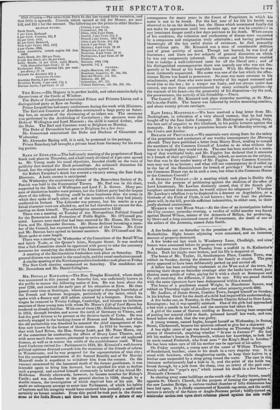MR. DOUGLAS Krwsratnn,-The Hon. Douglas Kinnaird, whose death was announced
in this journal on Saturday last, was sufficiently known to the public to excuse the following notice of him. He was born about the year 1786, and received the early part of his education at Eton. He then passed some time at Gottingen, where he acquired a thorough knowledge of the French and German languages, particularly of the latter, which he spoke with a fluency and skill seldom attained by a foreigner. From Got- tingen he removed to Trinity College, Cambridge, and became an intimate associate of those young men with whom Mr. Moore's Life of Lord Byron has rendered us already familiar. With one of them (Mr. Hobhouse) he travelled, in 1813, through Sweden and across the north of Germany to Vienna, and had the good fortune to be present at the decisive battle of Culm. He was actively engaged in the banking-house of Ransom and Morland, and when the old partnership was dissolved he assumed the chief management of the firm now known by the former of those names. In 1815 he became, toge- ther with Lord Byron, the Hon. George Lamb, and Mr. Peter Moore, one of the committee for conducting the affairs of Drury Lane Theatre, and, with more merit than success, attempted to revive some of our old neglected dramas, as well as to restore the credit of the establishment itself. When Lord Cochrane retired /*roll Parliament in 1818, Mr. Kinnaird's well-known political opinions directed towards him the attention of the friends of reform in Westminster, and he was proposed for the representation of that city; but the unexpected nomination of Sir Samuel Romilly and of Sir Murray Maxwell made it expedient to withdraw him from the contest. On the vacancy occasioned by the lamented death of the former gentleman, it was intended again to bring him forward, but he signified his wish to decline such a proposal, and exerted himself strenuously in behalf of his friend Mr. Hobhouse. Shortly afterwards, however, he became member for Bishop's Castle ; and was re-chosen at the general election in 1820; though by a double return, the investigation of which deprived him of his seat. • He made no subsequent attempt to enter into Parliament, of which his habits of business and his integrity would have rendered him probably a useful and certainly an honest member. From this period he took part in the discus- sions at the India klouse ; and there has been scarcely a debate of any consequence for many years in the Court of Proprietors in which his ? name is not to be found. For the last year of his life his health was observed to be on the decline; but the illness which terminated fatally did not make its appearance until two months ago, nor was he considerel in any imminent danger until a few days previous to his death. When aware of his condition, the irritation and restlessness of disease were succeeded by a composure and resignation truly admirable ; and having performed becomingly all the last awful duties of existence, he died peaceably and without pain. Mr. Kinnaird was a man of considerable abilities and of great activity of mind. Though not learned, he was fond of literature ; and there are few subjects of general discussion on which he was not competently informed. His station and his fortune enabled him to indulge a well-cultivated taste for all the liberal arts ; and of his distinguished contemporaries there was scarcely one who was not fre- quently to be found at his hospitable board. With Mr. Sheridan he was most intimately acquainted. His name was one of the last which the affec- tionate Byron was heard to pronounce. No man was more constant in his attachments, and those who were most worthy of his regard esteemed and loved him to the last ; for a temper too hasty, and not always under due control, was more than counterbalanced by many estimable qualities—by the warmth of his heart—by the generosity of his disposition—by the zeal, the perseverance, the activity of his friendship.— Times. The funeral of Mr. Kinnaird took place yesterday morning, at St. Mar- tin's-in-the-Fields. The hearse was followed by twelve mourning-coaches, and about twenty private carriages.


















 Previous page
Previous page